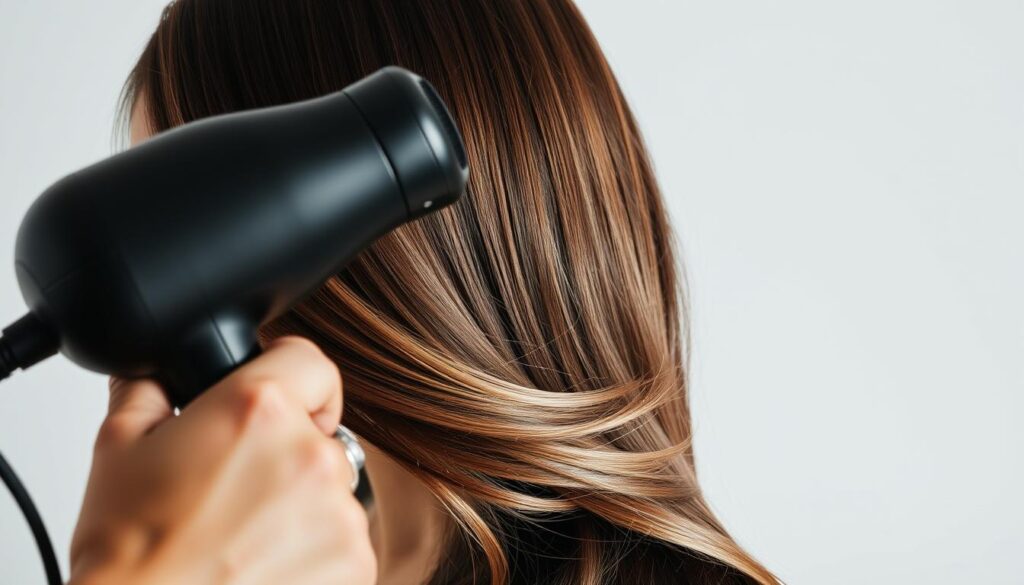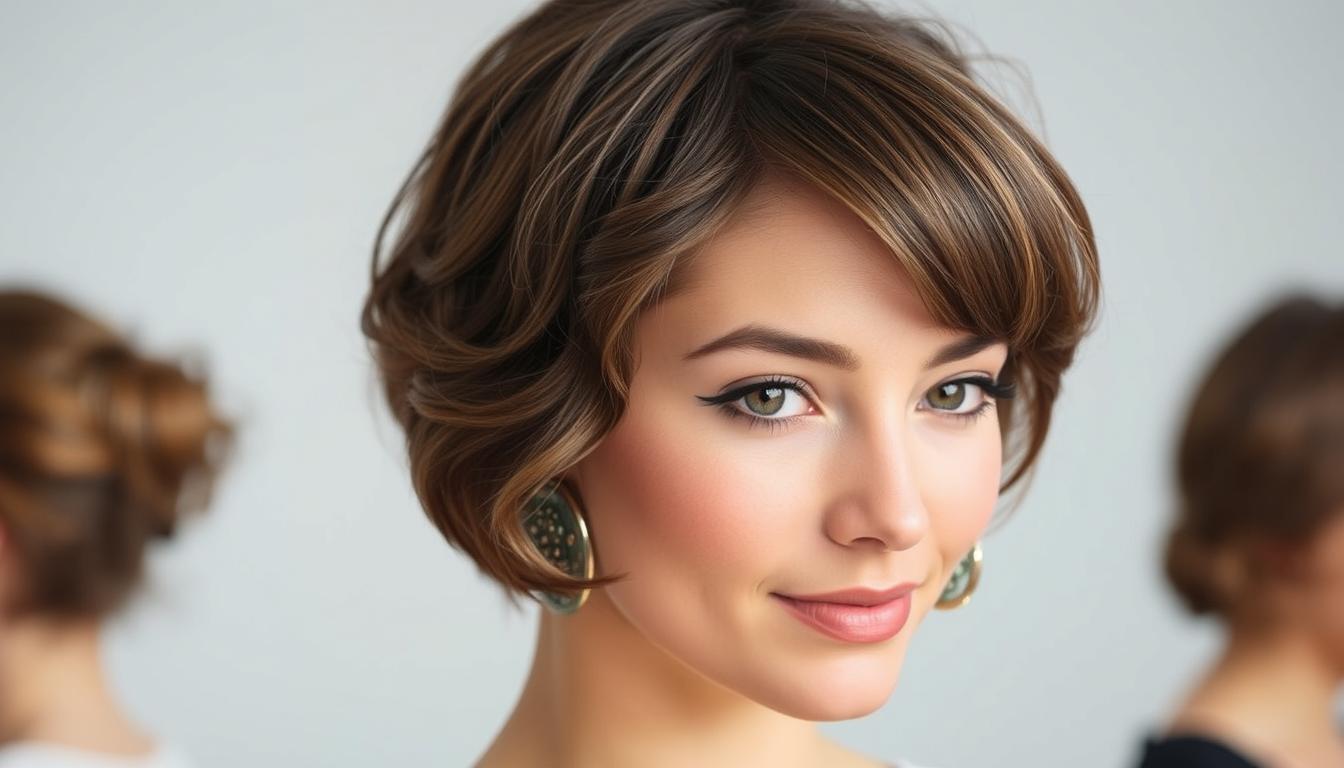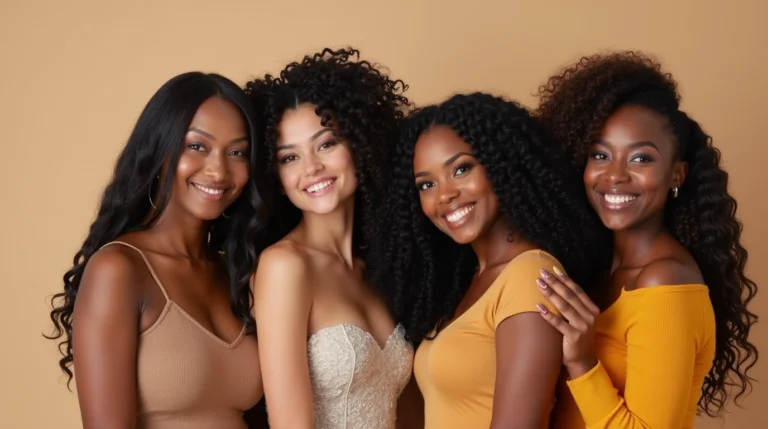Short Hairstyles for Thin Hair: How to Make Your Hair Look Fuller
Every morning, I’d stare at the mirror, feeling down about my thin hair. It fell flat against my scalp, and I longed for volume and texture. If you’ve felt the same, you’re not alone in your search for fuller hair.
Thin hair can really knock your confidence. But, with the right styling tricks, you can make your fine hair look thick and lively. Whether your hair is naturally thin or thinning, there are many ways to make it look fuller.
This guide will teach you all about managing and styling thin hair. You’ll learn about your hair type and find the best short hairstyles for volume. You’ll discover professional secrets to get the hair you’ve always wanted.
Table of Contents
Understanding Thin vs. Fine Hair: What’s the Difference
Hair can be confusing, but understanding thin and fine hair is key. These terms mean different things and affect how you care for your hair.
Identifying Your Hair Type
Knowing if you have thin or fine hair is important for good hair care. Here’s a quick guide to help you figure out your hair type:
- Thin Hair: Refers to hair density – fewer hair strands per square inch of scalp
- Fine Hair: Describes the individual strand thickness – typically smaller in diameter
Common Causes of Hair Thinning
Hair thinning comes from many factors that affect your scalp and hair health. The main causes include:
- Genetic factors
- Hormonal changes
- Age-related hair loss
- Nutritional deficiencies
- Stress and lifestyle factors
Impact of Genetics and Hormones
Genetics greatly influence your hair’s thickness and thinning risk. Hormonal shifts, like during pregnancy or menopause, can also change your hair. Knowing these causes helps you tailor your hair care and styling.
If you’re dealing with ongoing hair thinning, see a dermatologist or trichologist. They can offer specific advice and treatments for your hair issues.
Essential Hair Care Tips for Thin Hair Management
Managing fine hair needs a special hair care routine. It should help add volume and protect your hair. The right hair care can make your hair look and feel fuller and healthier.
Choosing the right products is key for managing fine hair. Look for lightweight, volumizing shampoos that won’t weigh your hair down. Here are some important tips:
- Choose clarifying shampoos that remove product buildup
- Use volumizing conditioners sparingly
- Apply conditioner only to mid-lengths and ends
- Avoid heavy, oil-based hair products
Your washing technique is as important as the products you use. When shampooing thin hair, focus on the scalp to remove excess oil and build volume. Gentle massaging can stimulate hair follicles and promote healthier growth.
Protecting your hair from damage is crucial in a hair care routine for thin hair. Here are some protective strategies:
- Use heat protection spray before styling
- Limit heat styling to prevent breakage
- Use soft hair ties to prevent pulling
- Sleep on silk pillowcases to reduce friction
By following these hair care tips, you’ll create a routine that nurtures your thin hair. It will add volume and help maintain its health and appearance.
Best Styling Products for Adding Volume to Thin Hair
Transforming thin hair into a voluminous masterpiece requires the right styling products. Choosing products that enhance your hair’s natural texture can greatly improve your look and confidence.
The key to fuller-looking hair is using specialized products for thin hair types. Your hair care routine should include lightweight, volumizing solutions. These add body without weighing down your hair.
Volumizing Shampoos and Conditioners
When looking for the perfect volumizing products, focus on these key benefits:
- Lightweight protein-based ingredients
- Root-lifting technologies
- Moisture without heavy buildup
Dry Shampoo for Thin Hair
Dry shampoo for thin hair is a game-changer. It absorbs excess oil, adds instant volume, and texture. Batiste Volumizing Dry Shampoo is a top pick for quick hair refresh and bounce.
Heat Protection Essentials
Protecting your delicate thin hair from styling damage is key. Heat protection sprays act as a barrier against hot styling tools. They prevent breakage and keep your hair healthy.
| Product Type | Key Benefits | Best For |
|---|---|---|
| Volumizing Shampoo | Adds body and lift | Fine, limp hair |
| Dry Shampoo | Absorbs oil, creates texture | Second-day styling |
| Heat Protectant | Prevents damage | All heat styling |
Finding the right combination of volumizing products takes experimentation. Your hair’s response to different products will vary. So, don’t hesitate to try various options to find your perfect hair care routine.
Professional Styling Techniques for Maximum Volume

Getting voluminous hair is not just about genetics. Professional styling can turn thin hair into a full, bouncy look. Let’s dive into expert methods to boost your hair’s volume and get salon-quality looks at home.
Blow-drying tips are key for instant lift and body. Begin by using a volumizing root spray on your hair. When blow-drying, flip your head upside down for maximum root volume. Use a round brush to lift hair at the roots while directing heat from your blow dryer.
- Use hair rollers for long-lasting volume
- Blow-dry roots in the opposite direction of natural hair fall
- Apply lightweight volumizing products
- Avoid heavy styling creams that weigh hair down
Hair rollers are a classic for adding dimension to thin hair. Choose velcro rollers for quick volume or heated rollers for more structured styles. Roll hair at the roots and let them cool completely before removing.
| Styling Technique | Volume Impact | Difficulty Level |
|---|---|---|
| Upside-down blow-drying | High | Easy |
| Velcro roller set | Medium to High | Moderate |
| Root teasing | High | Advanced |
Mastering volume styling takes practice and patience. Always protect your hair from heat damage with a quality heat protectant spray. With these techniques, you’ll turn thin hair into a voluminous, eye-catching style.
Short Hairstyles for Thin Hair That Create Fullness
Finding the right hairstyle for thin hair can change your look and boost your confidence. Short haircuts are great for adding volume and making hair look thicker. Pixie cuts, bob hairstyles, and textured short cuts can dramatically change how you look.
Choosing the right short hairstyle depends on your hair type and face shape. Professional stylists use special techniques to add volume and make hair look fuller.
Pixie Cuts and Variations
Pixie cuts for thin hair are a bold, easy style. These ultra-short cuts add volume by removing weight and adding layers. The benefits include:
- Instant volume at the roots
- Minimal styling time
- Versatile styling options
- Lightweight feel
Bob Styles and Lengths
Bob hairstyles are versatile for thin hair. They range from chin-length to shoulder-skimming, creating thickness with cutting techniques. Consider:
- Layered bobs for added texture
- Angled cuts that create dimension
- Textured ends to maximize volume
Textured Crop Cuts
Textured short cuts are an edgy choice for thin hair. Choppy layers and razor-cut techniques add movement and thickness. A skilled stylist can help you get a dynamic, voluminous look that fits your style.
Remember, the key is to find a skilled stylist who knows how to work with thin hair. They can tailor the cut to your hair type and face shape.
The Role of Proper Hair Cutting Techniques

Choosing the right hair cutting technique can transform thin hair from flat to fabulous. When you’re dealing with hair cutting for thin hair, strategic approaches make all the difference in creating volume and texture.
Blunt cuts are a game-changer for those with thin hair. These precise cuts create an illusion of thickness by making each strand appear fuller and more substantial. Unlike layered styles that can sometimes reduce volume, blunt cuts provide a solid, dense appearance that makes your hair look more robust.
- Blunt cuts create a sharp, clean line that adds visual density
- Layering techniques can strategically add movement
- Precision cutting helps maximize hair’s natural volume
Professional stylists understand that layering techniques require careful consideration for thin hair. Soft, subtle layers work best, preventing your hair from looking too wispy or disconnected. The key is to create dimension without removing too much weight from your hair.
When discussing your haircut with a stylist, be specific about your hair’s texture and your desired outcome. Ask about point cutting – a technique where scissors are held at an angle to create softer, more textured edges that add depth and movement to thin hair.
Remember, the right hair cutting approach can dramatically enhance your hair’s appearance, making thin hair look fuller and more vibrant.
How to Maintain Volume Throughout the Day
To keep your thin hair looking full from morning to night, you need a plan. It’s not just about how you style it in the morning. It’s also about keeping it looking great all day.
- Carry a travel-sized texturizing dry shampoo for quick refreshes
- Use lightweight volumizing products that won’t weigh down your hair
- Learn strategic touch-up techniques to revive your style
Morning Styling Foundation
Begin with a good morning routine. Use products that lift your roots and blow-dry with a round brush. Technique matters more than time spent. Focus on lifting your hair at the roots.
Strategic Touch-Up Techniques
When your hair loses volume during the day, a quick fix can help. Turn your head upside down and spray dry shampoo on your roots. This absorbs oil and gives you instant lift. Gently rub your scalp to spread the volume and add bounce.
Pro tip: Always have a travel-sized texturizing spray in your bag. A few spritzes can turn flat hair into a full look in seconds.
Color Techniques That Create the Illusion of Thickness
Turning thin hair into a thick, voluminous look starts with smart hair color choices. The right color can make your hair look thicker. This is why dimensional color is key to fuller-looking hair.
Here are some top techniques for choosing hair color for thin hair:
- Highlights for volume: Lighter strands add depth and dimension
- Lowlights add shadow and complexity
- Root smudging creates a dense look at the scalp
Dimensional color is like a magic trick for your hair. Using different shades in the same color family makes hair look thicker. Lighter pieces near the face and darker underneath add volume and texture.
Professional colorists suggest:
- Warm, rich tones reflect light well
- Stay away from single, flat colors that make hair look thin
- Try balayage or subtle highlights
Your hair color can greatly help make your hair look fuller and more vibrant. Find the right shade and technique with a skilled colorist for your hair type.
Common Styling Mistakes to Avoid with Thin Hair
Thin hair needs extra care. Many people unknowingly harm their hair with common mistakes. These mistakes can make hair thinner and break more easily. Knowing these mistakes can help keep your hair healthy and looking good.
Heat Styling Errors to Watch Out For
Too much heat styling is very damaging for thin hair. Your hair can become brittle and weak from high temperatures. To avoid damage, follow these important tips:
- Use heat tools on the lowest possible temperature setting
- Always apply a heat protection spray before styling
- Limit heat styling to 2-3 times per week maximum
- Invest in ceramic or tourmaline styling tools
Product Application Pitfalls
Using too many products can harm thin hair as much as over-styling. Too many products can make hair look flat and greasy. Here’s how to use products wisely:
| Product Type | Recommended Amount | Application Tip |
|---|---|---|
| Volumizing Mousse | Quarter-sized amount | Apply to roots only |
| Hair Serum | Pea-sized drop | Focus on ends, avoid scalp |
| Dry Shampoo | Light spray | Use 6 inches from scalp |
Avoiding these common mistakes can help keep your hair healthy and full. Remember, less is often more when styling thin hair.
Conclusion
Managing thin hair is easier than you think. You’ve learned how to improve your hair’s look and feel more confident. It all starts with understanding and embracing your hair’s unique traits.
This guide has shown you how to add volume and fullness to your hair. Every strand is special, and your thin hair can be just as beautiful. Try different styles and products to find what makes you feel best.
Your hair shows off your personal style. By using the right haircut and products, you can express yourself. Celebrate your hair’s natural texture and give it the care it needs.
Hair confidence comes from believing in yourself. Be patient and enjoy finding what works for you. With the right attitude and creativity, you’ll create styles that make you feel great.






